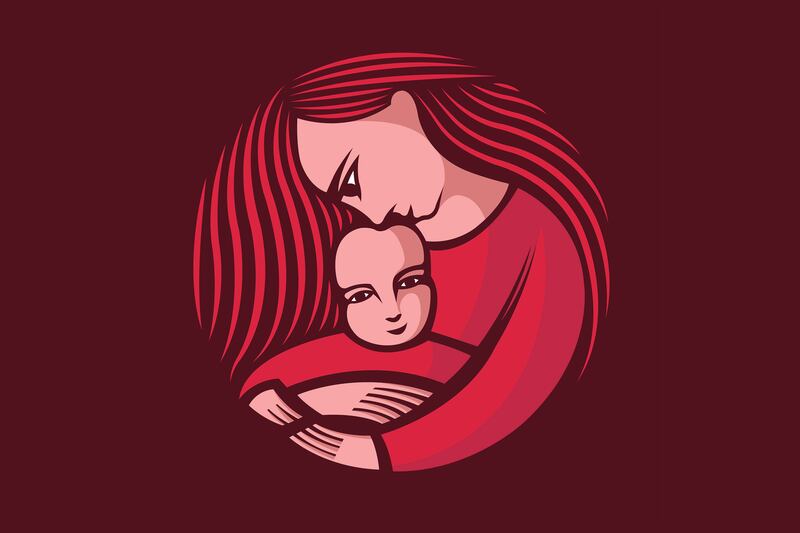On Mother’s Day, I don’t want a brunch out or a bouquet of flowers. I want America to deliver a family policy that supports women as mothers, not simply as parents. Men and women are equal in dignity, but treating us as biologically equivalent makes for bad family policy.
A mother uses parental leave to bond with her baby, to learn to feed her child and to recover physically from pregnancy and childbirth. A father is home to bond with his baby, but also to take care of his wife and child. The baby is uniquely dependent on his or her mother — even when mothers are not breastfeeding, it is her heartbeat the baby has heard ever since 18 weeks in utero. And, as late as three months after birth, it is her heartbeat that the baby’s heart synchronizes to when they interact face to face. The baby’s dependence on the mother makes her more dependent on family, friends and others for support. When it comes to policy, that needed support is lacking.
Before negotiations collapsed, President Joe Biden’s “Build Back Better” plan proposed offering all parents four weeks of paid leave. That proposal is insufficient for mothers as mothers in particular. For the 30% of mothers who deliver their children by c-section, the estimated recovery time is six weeks. During that period, mothers are supposed to avoid lifting anything heavier than the baby — a nearly impossible remit for moms who have an older child at home along with their newborn. “Mama has a booboo,” we kept saying to my 2-year-old as she asks me to lift her into her crib.
Four weeks leave is insufficient, but it would be an improvement over the status quo. According to the 2005 Listening to Mothers II Survey, 3 in 5 mothers had no paid parental leave. Those who were offered paid leave received an average of 3.3 weeks off, not necessarily at full wage replacement.
Well after women are back to work, we may need to take additional time off for physical therapy to recover from labor and pregnancy. In the U.S., as many as 40% of mothers don’t make it to their six-week postpartum visit. They miss the chance to ask questions, be screened for postpartum depression and be assessed for pelvic floor issues. Even for the women who make it, the help may come later than it’s needed.
The American College of Obstetricians and Gynecologists recommends that women be contacted by their OB or other provider in the first three weeks postpartum so they don’t struggle alone. The group has expressed regret that home visits are so rare in the U.S. — it’s certainly easier to be seen at home than to bundle your baby into a carseat and carry them into a doctor’s office. (And if you carry them in in the carseat, you’re breaking the “don’t lift anything bigger than your baby” rule.)
Even women who come in to the doctor’s office may not get the help they need. While in other countries, pelvic floor therapy is recommended by default for postpartum women, American mothers often need to ask. Without help, it’s hard to make a full recovery. A 2009 study of more than 15,000 mothers in Oregon found that 17% were still struggling with incontinence 3 to 6 months after their babies were born.
When I go back to work next week, I’ll need to take off two hours once a week in order to drive 30 minutes each way to spend an hour at the physical therapist. If my husband didn’t have a flexible schedule, I’d also need to arrange child care for my 3-month-old.
The needs of mothers don’t begin after birth. During pregnancy, mothers and fathers each need accommodations to care for their child. Both parents might need time off to go to doctor’s appointments. Although only I have to be there for an ultrasound to be performed, my husband wanted to be there to see our child. The first-trimester appointments were especially important to both of us — we are the parents to two living daughters and six children who died before birth. Those appointments weren’t just checkups; they always carried the potential to be the moment we heard, “I don’t hear a heartbeat.”
With our losses, we had to ask for bereavement leave, which wasn’t addressed specifically in either of our jobs’ employee handbooks. My boss was the son of an OB so he set an ad hoc generous policy. New Zealand now offers three days of bereavement leave after miscarriage, which is a good start. But here, too, there is a gender gap. Both my husband and I needed time to grieve, but only I needed to go through the physical process of delivering our child’s remains through miscarriage. The exact timing was as unpredictable as a normal due date.
In an uneventful pregnancy, a mother will still have a harder time than her partner as she navigates fatigue, nausea and pain. Drawing attention to these difficulties can feel like letting other women down — if women carry heavier burdens as parents, admitting to them gives employers an excuse to prefer men. But women aren’t helped by pretending to an equivalency that doesn’t exist.
Pregnancy, birth and recovery are not gender-neutral processes. Women need time to heal and financial cushions to care for their children. Mothers and fathers have unique responsibilities and gifts. Mothers carry the greater physical burden by nature; good fathers are distinguished by the way they choose to carry weight for their partner and their children. Mother’s Day is a fitting time to remember that if our family policy is just, it will not treat parents as interchangeable.
Leah Libresco Sargeant is the author of “Arriving at Amen” and “Building the Benedict Option.” She runs the substack Other Feminisms, focused on the dignity of interdependence.


